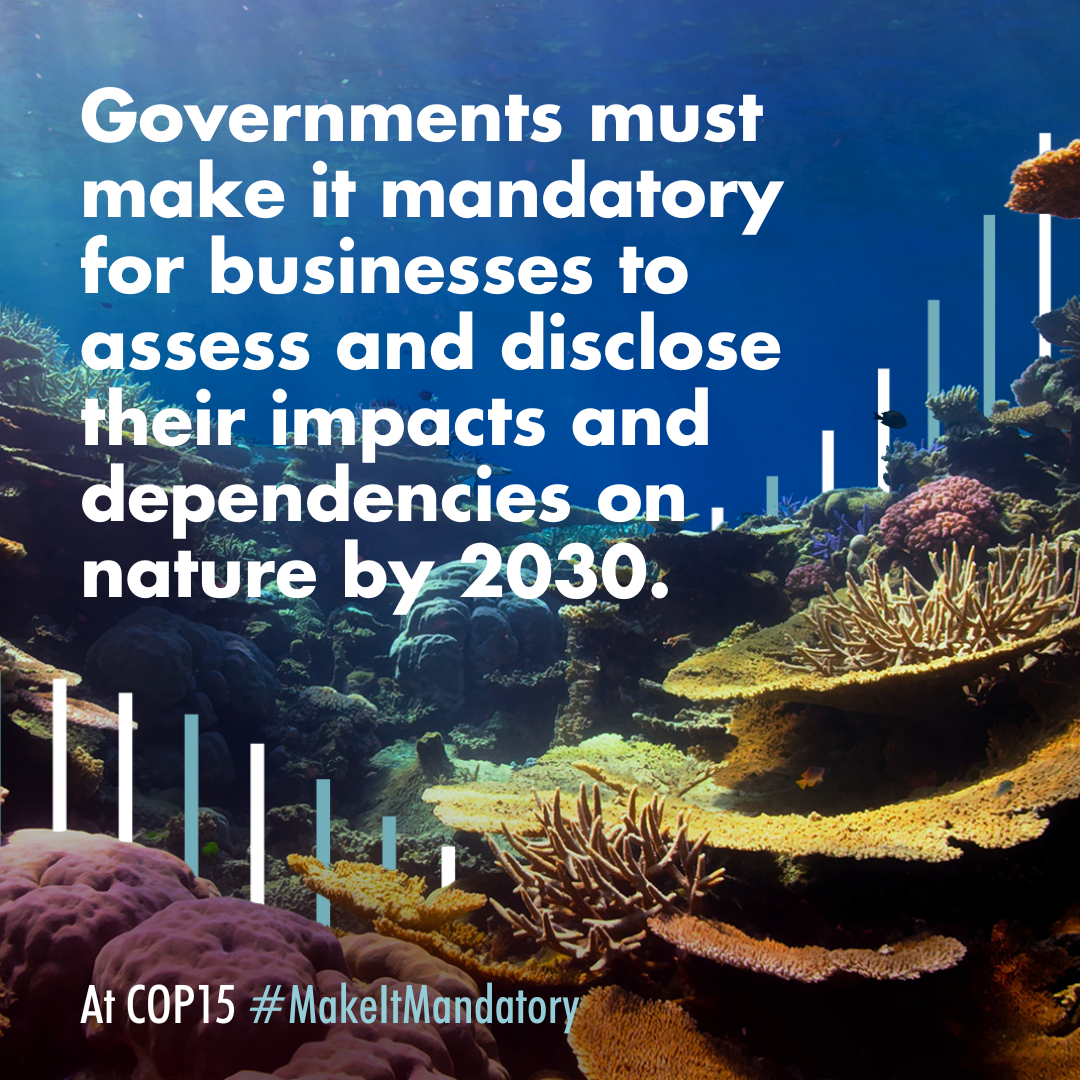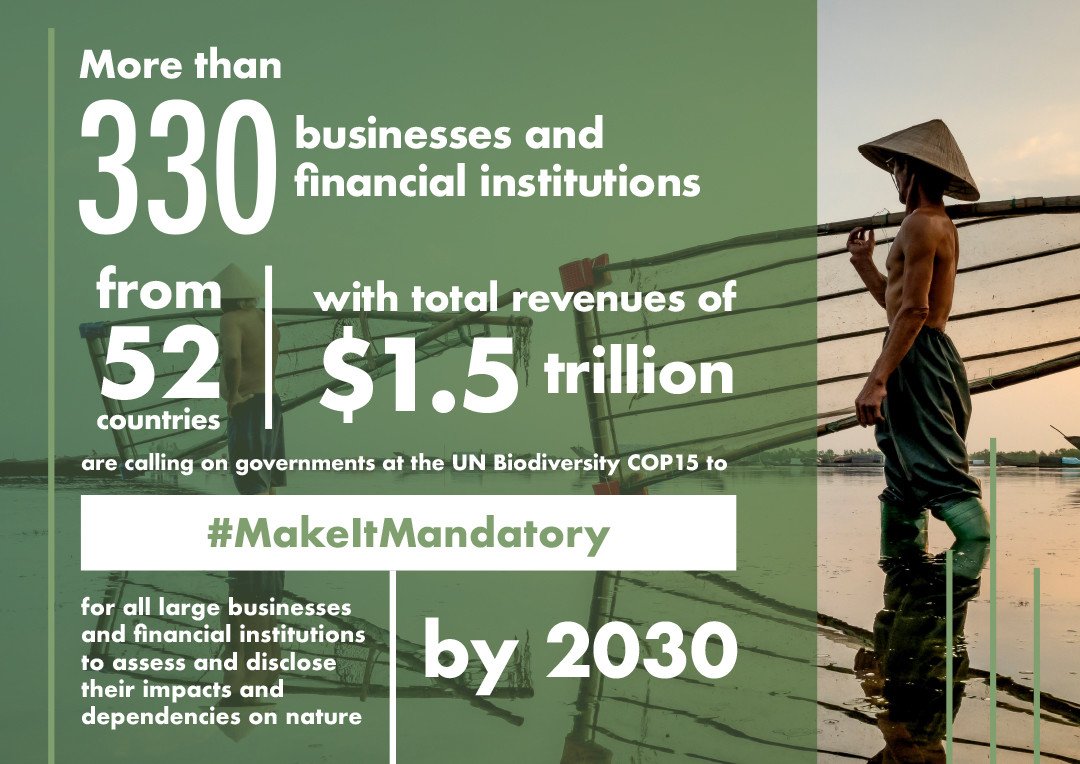What governments must agree at COP15 to accelerate business action on biodiversity and nature
Leading businesses are urging policymakers at the UN Biodiversity COP15 to agree ambitious policies that will steer corporate action on nature. Image: Unsplash/Jackie Hutchinson
This article, by Eva Zabey, Executive Director of Business for Nature, and Akanksha Khatri, Head of Nature and Biodiversity, World Economic Forum was originally published by the World Economic Forum.
The UN Biodiversity COP15 in Montreal offers a once-in-a-decade opportunity to agree a ‘Paris-style’ agreement for nature.
Leading businesses are urging policymakers at COP15 to agree ambitious policies that will steer corporate action on nature.
Companies call for the adoption of a strong Global Biodiversity Framework that will enable business to contribute to a nature positive future.
The UN Biodiversity COP15 finally opens its doors in Montreal this week after a two-year delay, and the stakes for our world could not be higher.
Nature is in crisis – as proved both by accelerating natural disasters and mounting scientific evidence – with human activity and global warming pushing nature towards tipping points beyond which our societies and economies will no longer be able to thrive.
Biodiversity loss is a challenge that must be addressed with the same urgency as climate change. A thriving natural world and a stable climate are both essential to support societies, livelihoods, wellbeing and the economy.
The climate and biodiversity crises are conjoined and cannot be solved independently from each other. Indeed, nature was at the centre of many discussions and decisions at COP27, and the architects of the Paris Agreement have urged leaders gathering in Canada to send a clear signal to the world that the status quo is over.
Governments need to agree a strong Global Biodiversity Framework at COP15
This means adopting an ambitious post-2020 Global Biodiversity Framework (GBF) at the conference – securing a Paris-style agreement that mobilizes all parts of society towards halting nature loss this decade.
In particular, it is crucial that the Global Biodiversity Framework changes the economic game for nature by setting policies and regulations that will require businesses and financial institutions to protect, restore and sustainably manage nature.
Business for Nature's #makeitmandatory campaign at COP15 Image: Business for Nature
Beyond the fact that biodiversity loss and the ecosystem collapse are considered to be in the top three most severe risks facing humanity in the next decade, the depletion of our natural resources creates specific physical, regulatory, reputational and market risks to business.
Conversely, transitioning to a nature-positive economy could unlock commercial opportunities worth $10.1 trillion per year as consumer, regulator and investor preferences shift away from harmful models.
A growing number of companies understand that their bottom line depends on the planet's health. Some are already taking action to transform their strategies, operations and value chains using existing voluntary guidance – starting with assessing and disclosing their impacts and dependencies on nature.
But voluntary action only goes so far: research on self-reported biodiversity data finds that while almost half of companies have started making commitments on nature, only a third of them have taken action to deliver them in the last year.
Solving the biodiversity crisis requires a step change, and that step change requires political leadership right now.
Last year, more than 1,100 businesses with $4.7 trillion in combined revenues signed a call to action urging governments to adopt policies to reverse nature loss in this decade. Now, hundreds of them are sending representatives to COP15 to contribute to discussions and help shape a transformative Global Biodiversity Framework, with three key requests of country negotiators.
1. Include mandatory requirements for all large business and financial institutions to assess and disclose their impacts and dependencies on nature in Target 15 of the Framework, together with an objective to halve negative impacts and increase positive impacts.
Mandating assessment and disclosure is the only way to ensure fair competition, drive large-scale action and collaboration, and accelerate standardization. It will also make the business case for investing in nature, allow consumers to take informed decisions, and help secure the rights of Indigenous peoples and local communities who care for the world’s most critical ecosystems.
Many business leaders recognize the need for a decisive shift, and more than 330 business and finance institutions are urging heads of state to ‘make it mandatory’ for companies to assess and disclose their impacts on nature. Weak language on this in the final agreement would be a missed opportunity given that this is what companies themselves are asking for.
Business for Nature is urging policymakers at the UN Biodiversity COP15 to 'make it mandatory'. Image: Business for Nature
2. Raise the ambition on reforming all environmentally harmful subsidies by redirecting or eliminating them, in Target 18 of the Framework.
At least $1.8 trillion per year is spent on subsidies that harm the environment – the equivalent to 2% of global GDP. Subsidies have been a key theme in the UN Convention of Biological Diversity negotiations, and crucial progress needs to be reflected in the final text – such as the inclusion of a numeric target to reduce harmful subsidies by at least $500 billion, and an agreement on the need for full subsidy reform that promotes greater transparency and a just transition for the most vulnerable communities.
We urgently need to stop subsidizing the destruction of the ecosystems we depend on, and to start financing our survival instead.
3. Adopt a clear and urgent mission to halt and reverse biodiversity loss by 2030.
As was the case for the Paris Agreement on climate, we need an ambitious, clear and enforceable global goal for nature. This goal needs to be stated upfront in the Global Biodiversity Framework to provide a clear rallying call for all stakeholders, including business and finance.
COP15 must create the right environment for business to take action on nature
Other issues must be addressed in the final text to create the right environment for business to take credible and meaningful action on nature. These include:
Setting out a comprehensive strategy to increase green finance and resources for the Global South
Recommendations on valuing and embedding nature in decision making
SMART targets for business to address the drivers of nature loss and steer the transformation of the food, land and ocean system
A robust monitoring, reporting and reviewing mechanism that makes clear the role of business and finance in implementing the Framework
These are big asks, but they are proportionate to the challenge we face and are supported by an unprecedented number of corporate leaders who recognize that nature underpins growth and resilience.
This should give policymakers confidence to aim high at COP15 in Montreal, and to set the direction, rules and finish line for game-changing business action on nature.



